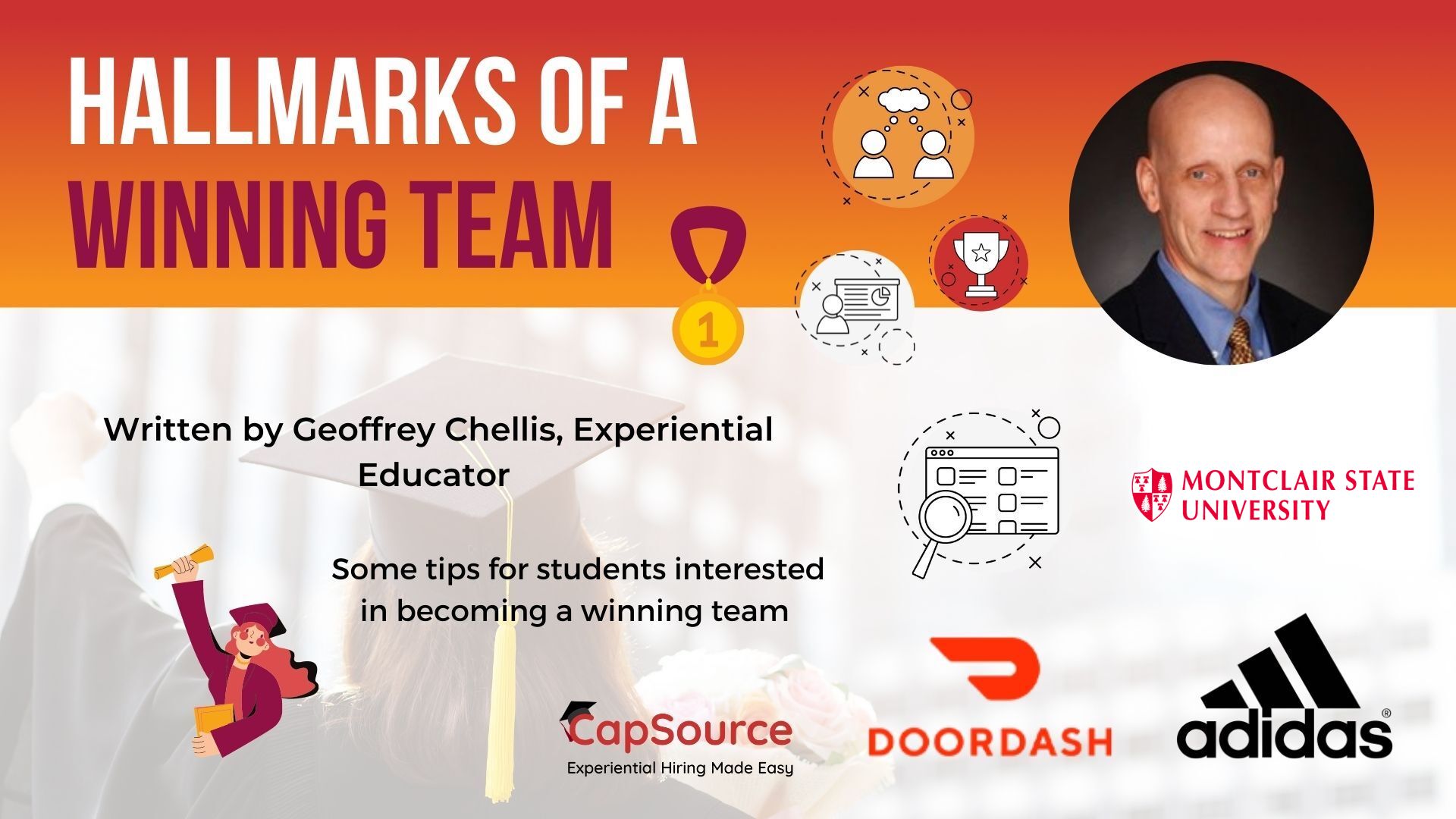
The Hallmarks of a Winning Team
Experiential Educator Geoff Chellis has been supporting students through project-based learning experiences at Montclair State University for many years. As an experienced pharmaceutical industry consultant, Geoff brings a wealth of expertise to all the projects he works on with his students. Over the past few semesters, Geoff has partnered with CapSource to reach new partners, including Adidas where his students “Analyzed the Running Footwear Market” and DoorDash where his students are working to “Help DoorDash Win Montclair State University Food Service.”
To help students understand the scope of the project and how this course is vastly different than previous courses most students have completed to-date, Geoff Chellis wrote this letter help them understand “The Hallmarks of a Winning Team.” Geoff has allowed us to share this letter with all of you to ultimately help you enhance your student experience when they’re engaged on Industry Integrated Experiential Learning Projects like the ones provided to students and faculty all around the world as part of the CapSource platform.
Dear Students,
This is a challenging course but it can also be a very rewarding one if you are willing to make the most of it. If you want to be a winning team and most importantly, win your next job interview, here are some secrets from the best of the best:
- Review the Course Charter and all of the assignments for the course as soon as possible. While it is possible to complete each of the assignments in the time provided, your work will be far superior if you get an early start on the assignments that come later in this course or at least keep them in mind when completing the early assignments.
- Divide & Conquer where it makes sense to do so. There is a lot of work in this course and we move at a fast pace so winning teams look for ways to divide up work that can be done individually. For example, this can be very effective for researching topics, analyzing competitors and recruiting Subject Matter Experts (SMEs). But they also know that it is important for everyone to be a part of some areas such as the client meetings and SME discussions. But even in these cases, while two heads are better than one, you don’t necessarily need the whole team to be a part of these sessions if you are good at sharing notes and debriefing as a group to ensure a common understanding.
- Meet Regularly. Let’s face it, texting is great for keeping in touch but it is a poor substitute for live (or Zoom) meetings because live meetings foster a free exchange of ideas, to challenge without coming off as negative, to find knowledge gaps to address, etc. Consider a weekly touch base by Zoom at the start of the week to make sure everyone is aligned, that the work is on track and to ask for help from each other. When it comes to major assignments like reports, you should always have a live meeting to gather points of view, brainstorm ideas and divide work across team members. Also, always set an internal deadline to regroup 48 hours before papers are due to critique each other’s contributions and allow time for one person to serve as editor to make sure there is a consistent story and voice throughout the paper.
- Start recruiting Subject Matter Experts right away. You don’t have to be an expert to be a consultant, you just need to know how to find experts and tap their expertise. While I may provide some Subject Matter Experts for all teams to use, the winning teams will work all their networks to find their own experts but that takes time and ingenuity — which means you should start right away.
- Involve your Subject Matter Experts in shaping your final recommendation. While it is imperative that you be respectful of your SME’s time, if they are willing to stay involved in your project, make the most of it. Winning teams will not only interview SMEs during the designated time in our course, they will get SMEs involved in their ideation sessions, share their draft recommendation and even conduct a mock presentation if the SME is willing to provide the time.
- Conduct multiple Ideation Sessions. Getting to a winning recommendation is usually an iterative process so it is best to have multiple ideation sessions. The first one is typically your brainstorming session and can uncover a lot of great ideas for your team to explore. But a winning team will regroup for additional ideation sessions after the team researched their initial ideas to determine which ones have the greatest potential. They will also involve SMEs in the later ideation sessions to get an objective assessment of their ideas and suggestions on how to strengthen them.
- Tap my expertise early and often. As an asynchronous course it is up to you to reach out to me when you want to meet, not the other way around. Winning teams know that they don’t have all the expertise they need, and that the best way to meet my expectations for assignments is to clarify what is required, share draft work and pick my brain along the way.
But don’t take my word for it, watch this 2 minute video to get advice from Leandra Merola, a Montclair State University Accelerated MBA Graduate who was on the “winning team” that consulted for Adidas.
I will be happy to discuss these tips in further detail with your team and welcome the opportunity to help you make the most of this course!”
Geoff Chellis, PCH
Adjunct Professor | Advisory Board Member
Feliciano School of Business
Montclair State University
PS: If you’re interested in checking out the Adidas winning team’s final deliverable, click here!

